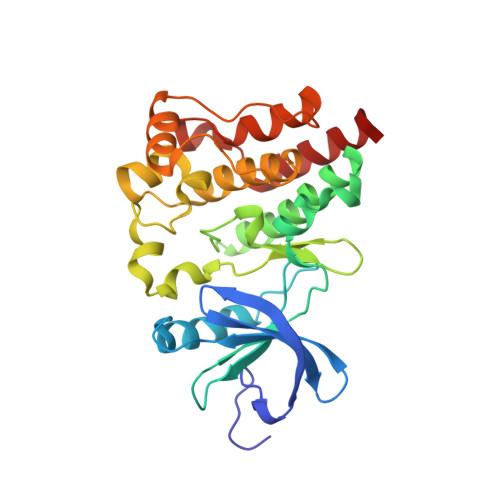Discovery of GDC-0853: A Potent, Selective, and Noncovalent Bruton's Tyrosine Kinase Inhibitor in Early Clinical Development.
Crawford, J.J., Johnson, A.R., Misner, D.L., Belmont, L.D., Castanedo, G., Choy, R., Coraggio, M., Dong, L., Eigenbrot, C., Erickson, R., Ghilardi, N., Hau, J., Katewa, A., Kohli, P.B., Lee, W., Lubach, J.W., McKenzie, B.S., Ortwine, D.F., Schutt, L., Tay, S., Wei, B., Reif, K., Liu, L., Wong, H., Young, W.B.(2018) J Med Chem 61: 2227-2245
- PubMed: 29457982
- DOI: https://doi.org/10.1021/acs.jmedchem.7b01712
- Primary Citation of Related Structures:
5VFI - PubMed Abstract:
Bruton's tyrosine kinase (Btk) is a nonreceptor cytoplasmic tyrosine kinase involved in B-cell and myeloid cell activation, downstream of B-cell and Fc¦Ă receptors, respectively. Preclinical studies have indicated that inhibition of Btk activity might offer a potential therapy in autoimmune diseases such as rheumatoid arthritis and systemic lupus erythematosus. Here we disclose the discovery and preclinical characterization of a potent, selective, and noncovalent Btk inhibitor currently in clinical development. GDC-0853 (29) suppresses B cell- and myeloid cell-mediated components of disease and demonstrates dose-dependent activity in an in vivo rat model of inflammatory arthritis. It demonstrates highly favorable safety, pharmacokinetic (PK), and pharmacodynamic (PD) profiles in preclinical and Phase 2 studies ongoing in patients with rheumatoid arthritis, lupus, and chronic spontaneous urticaria. On the basis of its potency, selectivity, long target residence time, and noncovalent mode of inhibition, 29 has the potential to be a best-in-class Btk inhibitor for a wide range of immunological indications.
Organizational Affiliation:
Genentech, Inc. , 1 DNA Way , South San Francisco , California 94080 , United States.

















